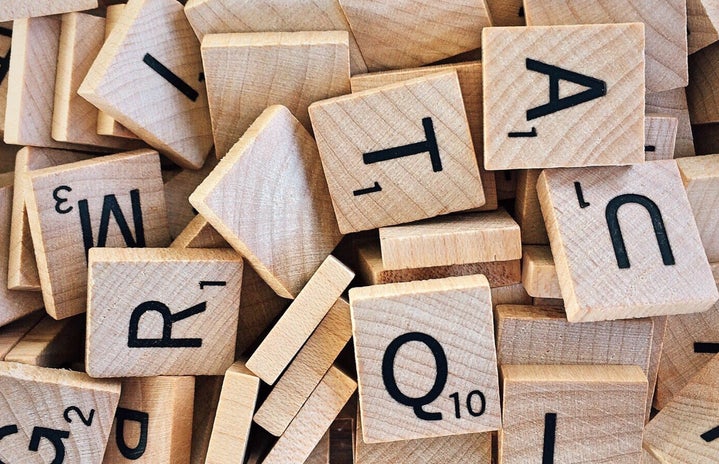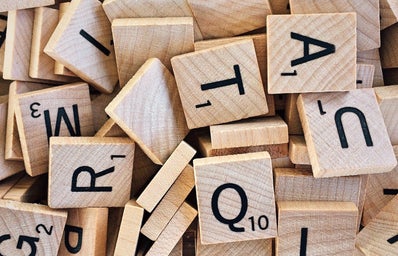Sometimes you just stumble upon or learn a quality word. Looking through my phone, I find dozens of random words that I put in my notes app or take a picture of. Some of them are forgotten, but other times, I actually start to incorporate them into my everyday vocabulary. Here are eight words that make me feel a little smarter every time I use them. All definitions are taken from Merriam-Webster.
1. Myriad
(Noun): A great number; (Adjective): having innumerable aspects or elements
I think one of the first times I heard this word was when I was watching the movie Heathers. Veronica was debating whether Heather Chandler would actually use the word ‘myriad’ after missing it on a vocab quiz weeks ago, and its usage was justified as a “badge for her failures at school.” Once I actually learned the definition of the word ‘myriad’ I made sure to put it to use. One of my old English teachers would tell her students to use the word ‘plethora’ in our theses (another great word, albeit slightly overused), I would swap it for myriad to be ~unique~ from the other students.
2. Dubious
(Adjective) Giving rise to uncertainty, doubtful
One of my favorite podcasts gives out “dubious advice.” In my opinion, more advice should be labeled as dubious, at least until everyone knows that not everything we hear can be considered factual or completely trustworthy. There is a certain virtue to be able to distinguish dubious truth from the actual truth.
3. Ruminate
(Verb) To go over in the mind repeatedly and often casually or slowly
Another old English teacher introduced this word to me. It quite literally means “to chew repeatedly for an extended period.” So basically, ‘ruminate’ describes the way a cow or a sheep would rechew their cud. Although useful to use in a metaphorical sense, I enjoy using it literally. The other week, the dining hall was serving frozen strawberries that were not the easiest to eat quickly. My roommate was struggling. I told her to ruminate on it. To be fair, when I ate my strawberries, it was more of a freeze-brain-induced gnaw than a chew, but I still think it works in that situation.
4. Propensity
(Noun) An often intense natural inclination or preference
This is a word that I often see attached to humans. The first phrase that comes to mind is “human propensity to change.” I couldn’t tell you where I first heard this phrase, but I think about it a lot (you could say that I ruminate on it). I find it oddly hopeful that humanity could be innately designed to act a certain way. I just hope it’s a propensity towards good.
5. Euphemism
(Noun) The substitution of an agreeable or inoffensive expression for one that may offend or suggest something unpleasant
‘Euphemism’ can also be used as a literary device, but I think it is important to recognize in everyday life, too. Sometimes euphemisms can be useful, like saying “they’ve moved onto a better place” instead of “they died.” But it is important to understand when euphemisms are used to hide the truth or give something the appearance of shame. For example, the phrase “feminine hygiene products” makes periods feel like a taboo subject when they don’t need to be. Euphemisms can be used as a mask in talking about controversial issues, which doesn’t help further discourse.
6. Iconoclast
(Noun) A person who attacks settled beliefs or institutions
I’ve never been a big fan of personality tests. My sister introduced me to enneagrams, and I’m not completely sold that I can be summed up into one of nine personalities, but I still find it interesting. On one enneagram site, a specific personality was described as “The Iconoclast.” It’s the person who shakes things up, who is willing to question the world around them. It felt like a powerful word to me, a word that should never be said aloud above a whisper. I think of the children’s tale “The Emperor’s New Clothes.” I think that the iconoclast is the person who points out the emperor isn’t wearing a robe.
7. Anthropomorphize
(Verb) To attribute human form or personality to
I think that one of the most human things that we can do is to anthropomorphize. Maybe a little selfish, but also very telling of how humanity sees the rest of the world. We think of our pets as human, we personify nature. Anthropomorphizing can border on misunderstanding and cruelty– it can be dangerous to see everything as human when it has its own unique characteristics.
8. Idiosyncratic
(Noun) A peculiarity of constitution or temperament: an individualizing characteristic or quality
I’ll be honest, I’m still not really sure what ‘idiosyncratic’ means. I’m still working on including it in my vocabulary. When I was looking through my notes app and photos trying to find random words to include in this article, this one came up a lot (I counted it at least four separate times). I figured it should at least get a mention on this list. The best way I can think of the word is like a quirk.
Keeping note of new words you come across is a great way to expand your vocabulary and knowledge base. For me, part of the joy in using new words is remembering the connotations that I have around them. I think of old teachers, books I read, and favorite songs. Feel free to steal some of my words to add to your list, I hope that you can find some joy in them, too.



